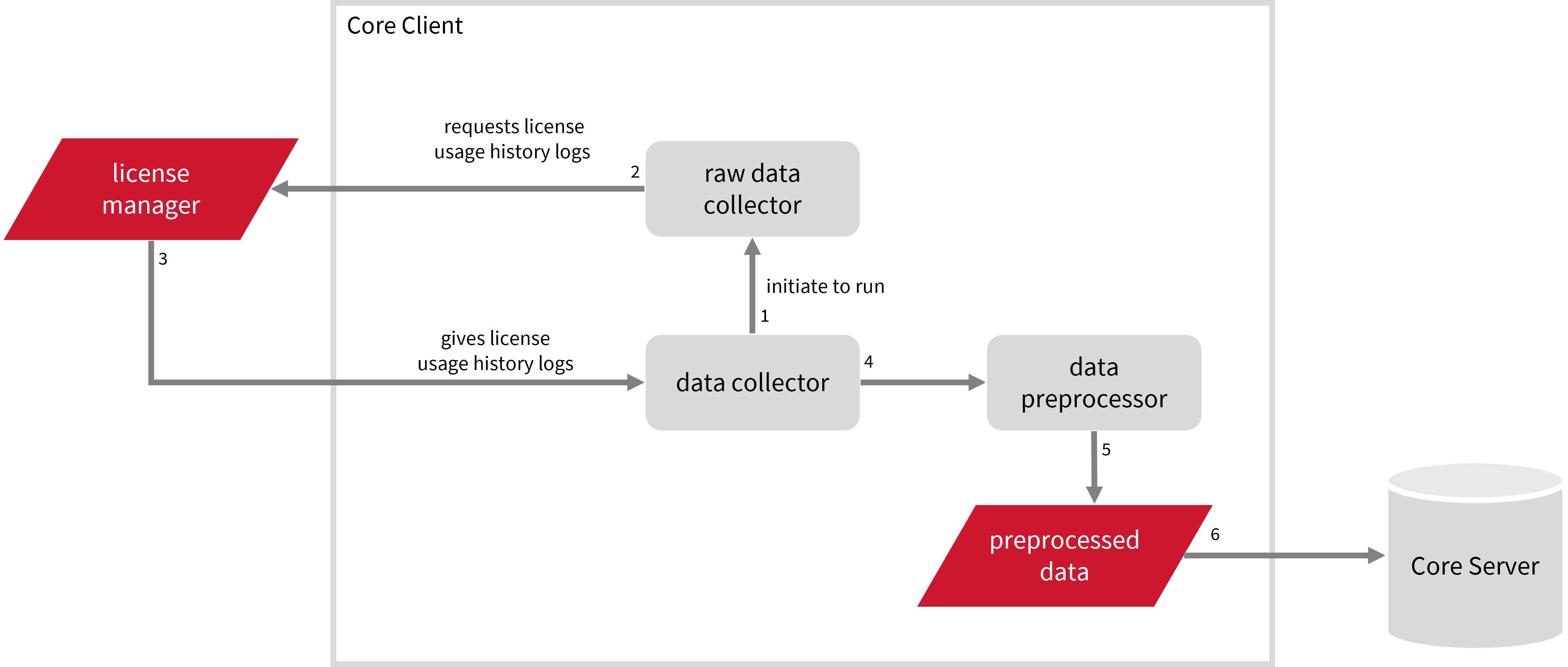#
Automation License Manager (ALM)
#
Introduction
Open iT supports ALM usage reporting by collecting log files and converting them to Open iT format.
An Open iT client is installed on your license server, and the license server does not create license usage history logs for this collection. The data collector initiates the raw data collector to request license usage history logs from the license manager every 5 minutes, triggering the data collection process. Once the logs are received, the raw data collector passes them to the data collector. The collected data is then sent to a data preprocessor for processing. After preprocessing, the final preprocessed data is sent and stored in the Core Server.

This will produce the following aggregated data types used for historical reporting:
Record Log Data:
- (89) Total License Use Licenseevents
- (90) Individual License Use Licenseevents
- (91) Usergroup License Use Licenseevents
- (108) Host License Use Licenseevents
- (109) Hostgroup License Use Licenseevents
Event Log Data:
The following sections will guide you in setting up the necessary configuration to collect and send the required data to the server.
Apply the configurations shown in the Open iT client.
#
Requirements
- An Open iT Client connected to an Open iT Server or a coexistent Open iT setup
- License server administrative rights
- Full path to the debug log file
#
Activating Log Data Collection
These are the required steps to activate collection of ALM log data.
Open a command prompt with Administrator level privileges.
Go to the bin directory, which is by default in
C:\Program Files\OpeniT\Core\bin, run the command:Command Syntaxcd $BIN_DIRExamplecd C:\Program Files\OpeniT\Core\binOnce in the directory, activate the collection of ALM log data, run the command:
Command Syntaxopenit_oconfinit -u "collect_license_alm-logs.root.scheduler.jobs.collect_alm_raw_licenselogs.general.active=true"Set the path to the database produced by ALM, run the command:
Command Syntaxopenit_oconfinit -u "collect_license_alm-logs.root.scheduler.jobs.collect_alm_raw_licenselogs.operations.arguments=automationlm --databasefile \"<database_file>\" --outputfile \"${OpeniT.directories.temp}/SqlCeUtil/ALM/automationlm.csv\" --logdir \"${OpeniT.directories.log}\""where
<database_file>is the path to the database produced by ALM. This is usually inC:\ProgramData\Siemens\Automation\Automation License Manager\logging.Exampleopenit_oconfinit -u "collect_license_alm-logs.root.scheduler.jobs.collect_alm_raw_licenselogs.operations.arguments=automationlm --databasefile \"C:\ProgramData\Siemens\Automation\Automation License Manager\logging\almdb.sdf\" --outputfile \"${OpeniT.directories.temp}/SqlCeUtil/ALM/automationlm.csv\" --logdir \"${OpeniT.directories.log}\""
The collection runs every 5 minutes by default, which triggers the data collection process. To configure the intervals, locate the instances attribute under collect_alm_raw_licenselogs, collect_alm_licenselogs, preprocess_alm_licenselogs-events, preprocess_alm_licenselogs-records, or transfer_alm_licenselogs in the same file and configure the attributes.
Refer to the ALM Log Job Scheduler Instances Configuration table to learn the attributes used to configure ALM data collection and transfer.
#
Configuring Log File Collection
The ALM log file configuration file, logfilecollector-alm.xml, is found in the Components directory, which is by default in C:\Program Files\OpeniT\Core\Configuration\Components. You don't need to update this, but if you want to learn more about its behavior, refer to the ALM Log Parser Configuration table.
#
Deactivating Record Log Data Collection
Turning on log data collection automatically aggregates record and event log data. If you want to collect event log data only, follow these steps.
Open a command prompt with Administrator level privileges.
Go to the bin directory, which is by default in
C:\Program Files\OpeniT\Core\bin, run the command:Command Syntaxcd $BIN_DIRExamplecd C:\Program Files\OpeniT\Core\binOnce in the directory, deactivate the collection of record log data, run the command:
Command Syntaxopenit_oconfinit -u "collect_license_alm-logs.root.scheduler.jobs.preprocess_alm_licenselogs-records.general.active=false"Change the handling of event logs, run the command:
Command Syntaxopenit_oconfinit -u "collect_license_alm-logs.root.scheduler.jobs.preprocess_alm_licenselogs-events.operations.arguments=--srcdir \"${OpeniT.directories.temp}/LogFileCollector\" --srcpattern raw-alm-license-LogFileCollector*.data --srcfilehandling rename --trgdir \"${OpeniT.directories.temp}/LogParserALM\" --module license --datatype event --resolution PT1H --matchobjects \"${OpeniT.directories.conf}/matchobjects-event-alm.oconf\" --type event --disable-statlogging"Change the data transfer schedule, run the command:
Command Syntaxopenit_oconfinit -u "collect_license_alm-logs.root.scheduler.jobs.transfer_alm_licenselogs.scheduling.start-triggers.trigger#1.job-name=preprocess_alm_licenselogs-events"
#
Verifying Log Data Collection
After activation, you can verify that the data is collected and sent to the server by following these steps:
Open a command prompt with Administrator level privileges.
Go to bin directory, which is by default in
C:\Program Files\OpeniT\Core\bin, run the command:Command Syntaxcd $BIN_DIRExamplecd C:\Program Files\OpeniT\Core\binRun the command:
Command Syntaxopenit_executor -r collect_license_alm-logsVerify that there are
archiver*.infiles created in the server in the archiver directory, which is by default inC:\ProgramData\OpeniT\Data\incoming\archiver.
#
Next Steps?
Renaming Vendor License Renaming Features Create and Add Report License Monitor

